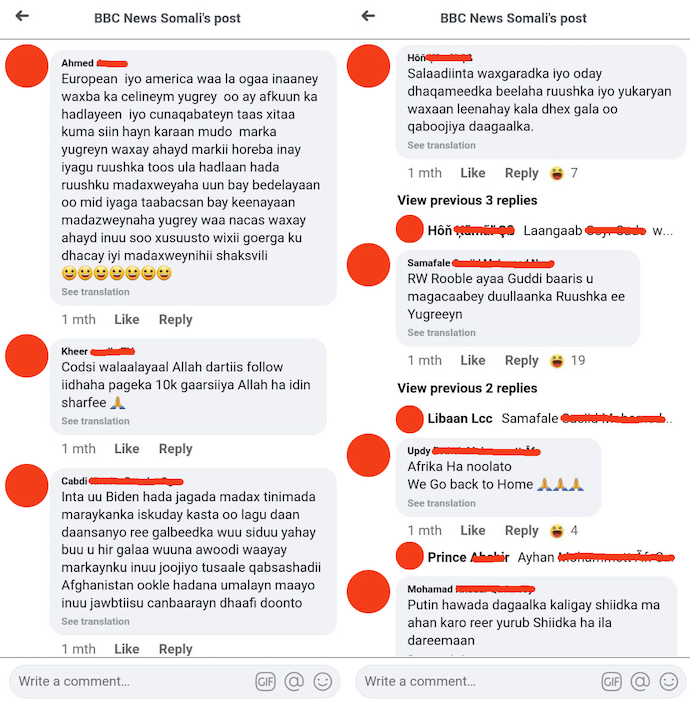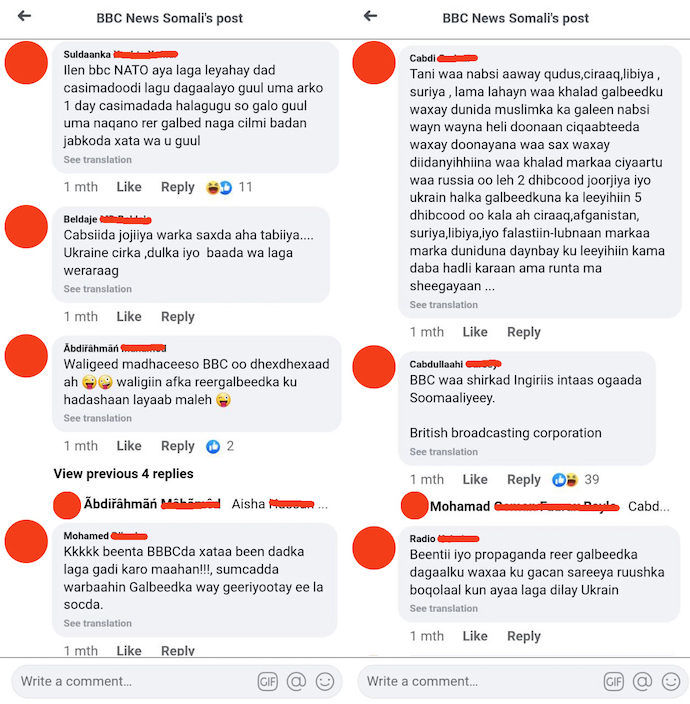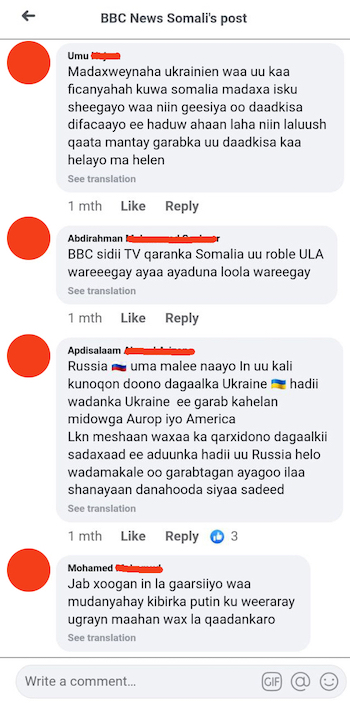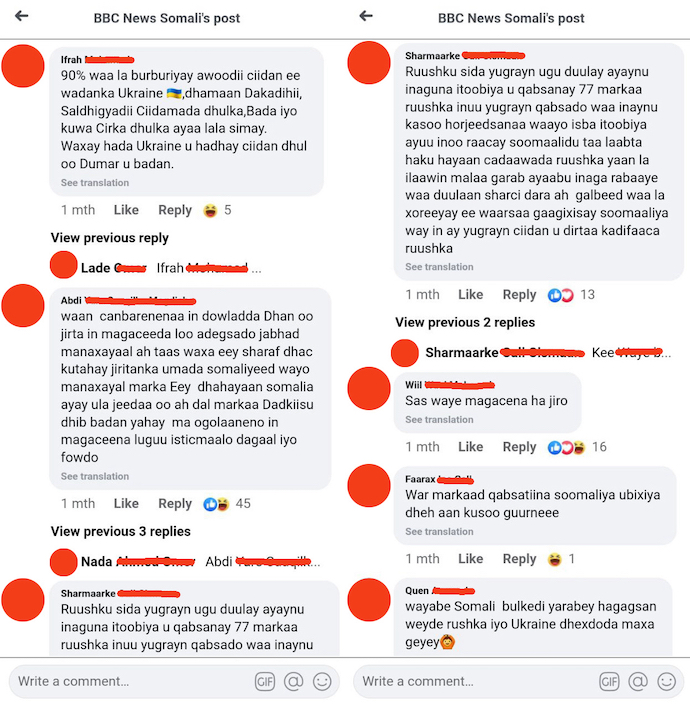The Platform
Latest Articles
by James Carlini
by Muhammad Zain Ul Abdin
by Ismaila Biliaminu Manne
by Ismaila Biliaminu Manne
by Arth Agarwal
by Sohail Mahmood
by Sehr Rushmeen
by Iqra Awan
by Areesha Anwer
by Abdul Mussawer Safi
by James Carlini
by Muhammad Zain Ul Abdin
by Ismaila Biliaminu Manne
by Ismaila Biliaminu Manne
by Arth Agarwal
by Sohail Mahmood
by Sehr Rushmeen
by Iqra Awan
by Areesha Anwer
by Abdul Mussawer Safi
How Somalis View Russia’s Invasion of Ukraine on Social Media
The Russian invasion of Ukraine has captured the collective attention of the world. As can be expected, views about the war differ from country to country. To try and gauge Somali public opinion about the war, I did a deep dive into the BBC News Somali page on Facebook. As experts will stress, this isn’t a scientific method to gauge public opinion.
Many Somalis, especially younger people, and adults, use the Internet to read local and international news. According to ReliefWeb: “Evidence indicates that 86% of adults and the same percentage of young people (15-25 years old) have access to mobile phones, and that these devices are increasingly used in all social and commercial aspects.”
Social media is widely used in Somalia, and many people use the medium to express their opinions. Their posts and comments give the impression that they are a reflection of popular beliefs, but journalists are warned that they may not reflect public opinion as a whole. This is because there are still sections of society that either don’t use social media or don’t express their opinions publicly, while some people are merely influenced by the moods of other commentators, not to mention the anonymity and the use of pseudonyms. But what is certain is that social media has changed the way we receive news and respond to it, and it is a treasure that can be used for research purposes and learning about audience trends despite ethical concerns.
I chose their Facebook page for its popularity in Somalia, and its relative independence. I have chosen to examine three links that the page published. The first is from February 23, a day before the war; the second is from the day the war started, or “the beginning of the special operation,” as Putin calls his war; and the third is from two days after the war began. My goal is to show a small glimpse into how some Somalis think and to critique some of their comments.
In the first link, on February 23, BBC News Somali shared a link entitled “Ukraine: Ciidamada manaxayaasha ah ee loo yaqaanno guutada Soomaalida ee bariga Ukraine” roughly translated as “The Ruthless Battalion in Eastern Ukraine, Known as the Somali Brigade,” with a picture of a tank manned by two soldiers. The post garnered some 391 comments, 84 shares, and it was liked by 2.4 thousand users. Most commentators focused on the naming of the battalion, with comments varying between opponents of the name and those who boasted about it. The battalion was originally a group of separatists founded by Mikhail Tolstykh, who was killed in the Donetsk region in 2017.
One of the commentators, whose name is Ifrah, wrote, “90% of the Ukrainian forces have already been destroyed, including the ports and military bases, the remaining are some infantry, mostly women.” This comment is notable for two things. First, false information and numbers wrapped in military jargon, as if Ifrah was influenced by the Russian propaganda circulating on social media before the war. In the second part of the comment, Ifrah – who is herself a woman – underestimates the eligibility of women in military service, although they have proven their worth in many of the world’s armies, and especially the strength with which Ukrainian women defend their country. Women amount to 15% of the Ukrainian army, which is among the highest percentages of any country in Europe.
This perception stems from the social structure in which the commentator was raised, as post-civil war Somalia still sees women as incompetent in many fields. But the truth is that there is no development without equality in education, opportunities, and the renaissance of all members of the nation.
Abdi wrote, “I condemn the use of our name for ruthless militias,” and, “We will not allow our name to be used for war and chaos.” The commentator’s way of writing is inspired by formal styles, and the pronoun “we” signifies national pride. The addition of “chaos” after the word “war” shows how young Somalis recall the chaos that befell us after the collapse of the central government in 1991.
User Sharmake commented, “Just as Russia invaded Ukraine, we invaded Ethiopia in 1977, [and back] then Russia supported it against us. Somalis should not forget the Russians’ enmity, and we should send an army to [help] defend Ukraine.” This is one of the most remarkable comments I have read, as it indicates that the commentator is still burdened with the events of the past. What is strange is the explicit verbal analogy between the invasion launched by Somalia and the invasion launched by Russia, which expresses pride without self-criticism. In the last suggestion, that Somalia should “send an army to [help] defend Ukraine,” the commentator conveys the idea of “revenge and reciprocity,” not love for Ukraine.
In the second link, from the first day of the war, after Putin’s ominous speech, BBC News Somali published a link “Madaxweyne Putin oo ‘jawaab deg deg ah’ ugu hanjabay reer galbeedka haddii ay isku dayaan inay farageliyaan weerarka uu ku qaaday Ukraine” roughly translated as “Putin threatens the West with a quick response if they interfere in his attack on Ukraine” with his picture affixed to the post. It garnered 205 comments, 52 shares, and it was liked by 1.4 thousand users. Many commentators wondered about the absence of Western deterrence, as it was claimed, and many admired Putin’s daring, with comments frequently describing him as a “Laandheere,” meaning “a man of high lineage, born of sultans and princes.” The word was originally praise for an honorable man, but later was generalized and became praise for anyone famous for his deeds, whether good or bad.
In the comments, Ahmed wrote, “It was known in advance that the Europeans’ and Americans’ support to Ukraine will not exceed rhetoric and sanctions that do not last, and the Ukrainians [will] have to negotiate with Russia.” Adding “The Ukrainian president should have remembered what happened to Georgia, and President [Mikheil] Saakashvili.” When the commentator describes how Western support “will not exceed rhetoric,” Ahmed is expressing resentment or mockery of the West’s usual condemnations and slow movements to prevent violence, such as what happened with the Rwanda genocide in 1994, in Yugoslavia, Syria, and now in Ukraine. The commentator also gives the Georgian-Russian war in 2008 and the disappointment of its president as an example.
But the commentator shows his lack of a complete picture when he urges Ukraine to negotiate with Russia, forgetting that Russia is the aggressor: a nation that has created a food crisis in Somalia through its grain embargo on Ukraine.
User Hôň wrote, “I call upon the sultans, intellectuals, and chieftains of Russia and Ukraine to intervene to end the war.” The commentator here thinks the situation in Ukraine and Russia is like the dominant situation in Somalia, where traditional organizations such as tribes hold the confidence of society more than the fragile state, and the tribal chiefs take the initiative to end disputes and skirmishes through social solidarity and the prevailing customs that extend back for hundreds of years. And indeed, to “intervene to end the war” is not an effective treatment for the causes of wars, because modern life and society in the process of historical changes need a strong administrative apparatus to solidify the rights and duties of citizens.
BBC News Somali did not stop expounding on Putin, as if it was looking to create a second Putin among the Somalis. On the same day, it published “Wax ka ogow cuntada, jimicsiga iyo jiifka madaxweyne Ruushka” translated as “Learn about Putin’s Food, Sports, and Way of Sleeping” with a picture of Putin swimming. Many commentators booed this, asking what they gained from knowing about his private life. In another link, BBC News Somali published “Kumuu sidiisaba hadal ka maqlaa madaxweyne Puntin?” translated as “Who Putin Really Listens To” and his picture with presumably one of his advisors.

Suldaanka wrote in the comments: “We did not know that [BBC News Somali] was the channel of NATO, and storming the capital of a country in one day was a defeat in itself.” He continued sarcastically: “The knowledge of the West has reached such heights that the news of defeat turns into victories.” The commentator accuses BBC News Somali of bias. His mockery of “the knowledge of the West” suggests his tacit acknowledgment of the West’s scientific superiority, but according to the analysis of his words, they reached the point of confusion and turned “the news of defeat…into victories.” But did this war really show the confusion of the West or their preparedness? This is what experts will answer later.
Abdi wrote a jumbled comment in which the sentences overlap, and translating it directly is difficult. In general, the content condemns the West for its attacks on Islam, using what has happened in Iraq, Palestine, and Libya as examples. Commenting from an ardent religious perspective – Somalis are Muslims and most of them are conservative – and illustrating examples of the West’s mistakes in the past, the author adds that the West will reap the consequences of its actions and is in fact reaping it now at the hands of Russia. He expresses his delight at Russia’s actions, as if Russia is innocent, and eventually creates a context – according to the analysis of his words – that today the war is between you, and tomorrow it will be between us.
In fact, I have seen many comments in other publications in which “Palestine” is repeated. This is a central issue for many in the Muslim world, and I believe that the two-state solution is the only solution to that crisis.


From my observations, it appeared to me that most commentators focused on the title of a post without clicking on the link or reading the article, and this is one of the shortcomings of social media. I also noticed that some commentators’ perceptions of events are based on their local conditions, and invoke history, religion, and popular proverbs to support the opposing arguments.
One recommendation I make is that media pages do not shorten the news with links that people may not read, but rather display most of the piece, so that readers do not make judgments based solely on the title. Another is to further highlight the human side of events and their global implications, rather than focusing on catchy headlines and obsession over likes and comments.
Finally, I should mention that among the 17 links in the coverage of the Russian invasion that was published by BBC Somali Facebook from February 24 to March 2, there was only one link that talks about the killing of five people in the bombing of the TV tower in Kyiv. Apart from that, the focus was on tanks, not on people’s suffering, and sometimes the pictures did not match the content of the news.
Ibrahim Sultan is a progressive Somali journalist, writer, and advocate for social justice. He is the Founder of the Somali Progressive Initiative.

